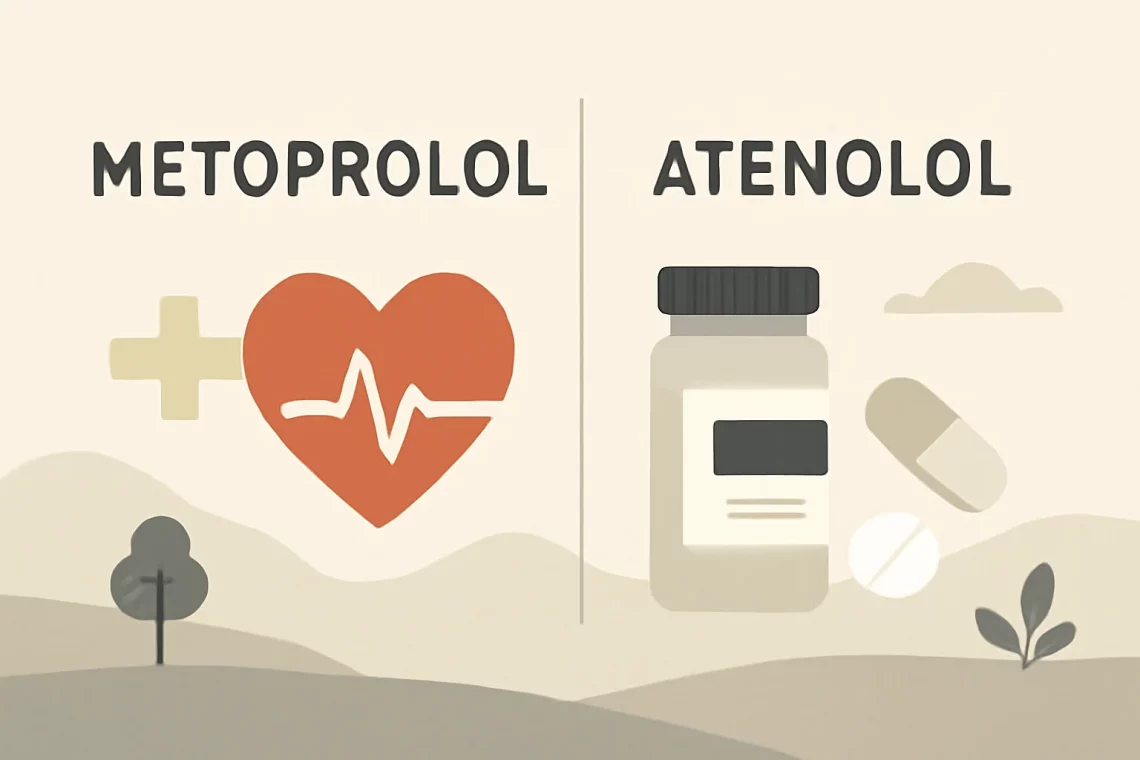-
Metoprolol vs Atenolol: Key Differences and Similarities Explained
Metoprolol and atenolol are two widely prescribed medications belonging to a class of drugs known as beta-blockers. These medications are primarily used to manage cardiovascular conditions, including hypertension, heart failure, and certain types of arrhythmias. Both metoprolol and atenolol function by blocking the effects of adrenaline on the heart and blood vessels, leading to a decrease in heart rate and blood pressure. This mechanism of action makes them effective in reducing the workload on the heart and improving overall cardiovascular health. The choice between metoprolol and atenolol can depend on various factors, including the specific health condition being treated, patient response to medication, and potential side effects. While both drugs…
-
Amoxicillin vs Flagyl: Which Antibiotic Is Right for You?
Amoxicillin and Flagyl are two widely used antibiotics that play crucial roles in treating various bacterial infections. While both medications aim to combat infections, they operate through different mechanisms and target different types of bacteria. Understanding their differences, uses, and side effects can help patients make informed decisions about their treatment options. Amoxicillin belongs to the penicillin class of antibiotics and is commonly prescribed for respiratory infections, urinary tract infections, and skin infections, among others. It works by inhibiting the growth of bacteria, effectively preventing them from multiplying and spreading. On the other hand, Flagyl, or metronidazole, is often used to treat infections caused by anaerobic bacteria and certain parasites.…
-
Benzonatate vs Hydrocodone: Which Cough Suppressant is Better?
Benzonatate and hydrocodone are two medications commonly prescribed for the relief of cough and respiratory symptoms. As the landscape of healthcare evolves, understanding the differences, uses, and potential side effects of these drugs becomes increasingly important for patients and healthcare providers alike. Benzonatate is a non-narcotic cough suppressant, while hydrocodone is an opioid that offers pain relief in addition to its cough-suppressing properties. The rise of opioid use has led to heightened awareness of the potential for addiction and misuse, prompting patients to seek alternatives. Meanwhile, benzonatate has gained popularity for its non-addictive nature and effectiveness in managing cough without the sedation associated with opioids. The decision to use one…
-
Yunnan Baiyao Dosage Guidelines for Dogs: What You Need to Know
Yunnan Baiyao is a traditional Chinese medicine that has garnered attention for its purported healing properties, particularly in managing bleeding and promoting wound healing. Originally developed for humans, this herbal remedy has found its way into veterinary medicine, with pet owners seeking natural alternatives for their canine companions. The use of Yunnan Baiyao for dogs is often associated with various health issues, including surgical recovery, trauma, and internal bleeding. However, the transition from human to canine use comes with its own set of considerations and guidelines. When introducing any supplement or medication to a pet’s regimen, it is essential to understand the proper dosage and potential effects. As with any…
-
Understanding Horse Bute: Uses, Benefits, and Precautions
Understanding Horse Bute: Uses, Benefits, and Precautions The world of equine care is filled with various treatments and remedies, each serving a unique purpose in maintaining the health and well-being of horses. Among these, horse bute, or phenylbutazone, stands out as a common non-steroidal anti-inflammatory drug (NSAID) used to alleviate pain and reduce inflammation in horses. Its origin dates back to the mid-20th century, and it has since become a staple in veterinary medicine. Despite its widespread use, the topic of horse bute often raises questions regarding its safety, efficacy, and proper usage. Horse owners and caretakers must fully understand the implications of administering this medication. Whether it’s for managing…
-
Understanding the Cytopoint Dosing Chart for Effective Treatment
Effective treatment of allergic dermatitis and similar conditions in dogs has become increasingly accessible with innovative therapies like Cytopoint. This groundbreaking injection provides relief by targeting specific proteins linked to inflammation and itching. As pet owners and veterinarians alike search for effective solutions, understanding the appropriate dosing becomes crucial for maximum efficacy. Cytopoint offers a targeted approach to managing allergic reactions in dogs, reducing the need for traditional medications that may have numerous side effects. However, the success of this treatment hinges on accurate dosing tailored to the individual dog’s weight and condition. This dosage precision not only ensures the best therapeutic outcomes but also minimizes the risk of potential…
-
How Much Diatomaceous Earth Should You Use for Dogs?
Diatomaceous earth (DE) has gained popularity among pet owners as a natural remedy for various issues, including pests and digestive health in dogs. This fine powder, derived from the fossilized remains of tiny aquatic organisms called diatoms, is rich in silica and has a range of uses. However, the question of how much diatomaceous earth to use for dogs is crucial for ensuring its effectiveness and safety. Many dog owners are intrigued by the potential benefits of DE, but they often find themselves confused about the appropriate dosage. With its increasing popularity, there is a wealth of information available, but not all of it is reliable or applicable to every…
-
Doxycycline for Cats: Safe Use Without a Vet Prescription
Doxycycline, a broad-spectrum antibiotic, is commonly used in veterinary medicine to treat a variety of infections in cats. As pet owners become more aware of their cats’ health needs, the question arises: can you safely use doxycycline without a veterinarian’s prescription? This topic has become increasingly relevant, especially with the growing trend of self-medication among pet owners. Understanding the implications of administering antibiotics, the potential benefits, and the risks involved is essential for anyone considering this path for their feline companions. Antibiotics like doxycycline are powerful tools in combating bacterial infections, but their misuse can lead to serious consequences, including resistance and adverse side effects. The unique physiology of cats…
-
Understanding Fish Cipro: Uses, Benefits, and Safety Tips
Understanding the complexities of medication can often feel overwhelming, especially when it comes to treatments for specific conditions such as bacterial infections. One medication that has gained attention in both human and veterinary medicine is Cipro, also known as ciprofloxacin. This fluoroquinolone antibiotic is primarily used to combat a variety of bacterial infections by inhibiting the bacteria’s ability to reproduce and grow. While Cipro is well known in human medicine, its application in treating fish ailments has garnered interest among aquarists and fish farmers. Understanding the use and benefits of Fish Cipro is essential for anyone involved in keeping or breeding fish, whether for personal enjoyment or commercial purposes. The…
-
Canine Aspirin Dosage Chart: Safe Guidelines for Your Dog’s Health
When it comes to our furry companions, ensuring their health and well-being is a top priority for any responsible pet owner. Just like humans, dogs can experience a variety of ailments that may require medical attention. Among the common health issues that dogs face are pain, inflammation, and fever, which can arise from conditions such as arthritis, injuries, or post-surgical recovery. In such cases, veterinarians may recommend the use of certain medications to alleviate discomfort and promote healing. One such medication that often comes to mind is aspirin, a well-known anti-inflammatory and pain-relieving drug. While it is widely used in humans, the question of whether it is safe and effective…







































